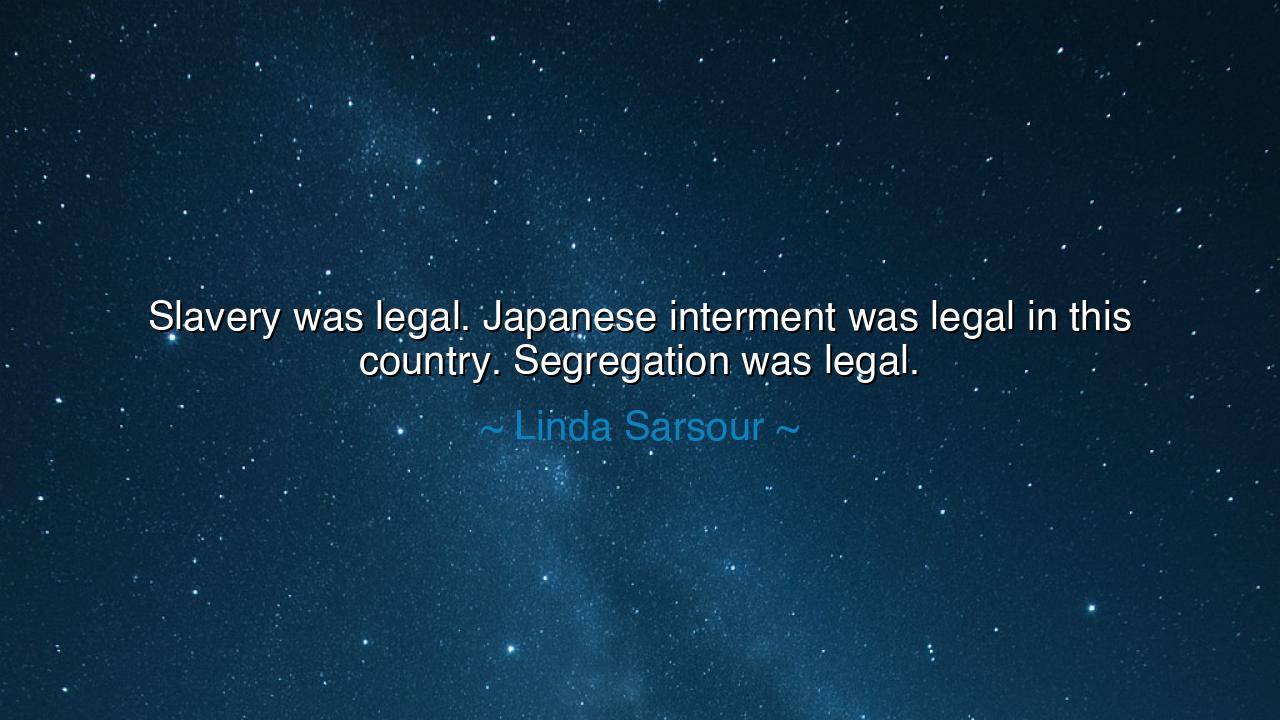
Slavery was legal. Japanese interment was legal in this country.
Slavery was legal. Japanese interment was legal in this country. Segregation was legal.






“Slavery was legal. Japanese internment was legal in this country. Segregation was legal.” Thus spoke Linda Sarsour, with the weight of centuries echoing in her voice. Her words are not mere accusation — they are a reminder carved into the conscience of history. She calls us to remember that law is not the same as justice, and that what is legal is not always what is right. The ancients knew that law is a tool forged by men, and as such, it may either serve virtue or bind it. A people may pride themselves on their statutes and decrees, yet still dwell in the shadow of moral blindness.
In these words lies a truth both terrible and luminous: legality has often marched hand in hand with cruelty. The chains of slavery, the camps of internment, the walls of segregation — all were once sanctioned by the courts, defended by lawmakers, and upheld by those who claimed to serve order. Yet time, the great judge, has overturned their verdicts. What was lawful became shameful; what was punished became praised. Sarsour’s quote awakens us to this eternal paradox: that morality must not bow to law — rather, law must bow to morality.
Let us look to the story of Frederick Douglass, born a slave under a system that was, at the time, entirely legal. The law gave his master the right to beat him, to sell him, to deny him his humanity. Yet Douglass rose in defiance, guided not by the law of man but by the higher law of conscience. When he fled bondage, the statutes called him a criminal; yet history now calls him a prophet. So too with those who sheltered the Japanese during the internment camps, or those who marched with Martin Luther King Jr. against the legal edicts of segregation. In breaking the law, they preserved justice; in defying authority, they obeyed the truth.
Slavery was legal — and yet it was evil. Internment was legal — and yet it was cruel. Segregation was legal — and yet it was unjust. Sarsour’s declaration strikes the soul because it exposes how men often confuse lawfulness with righteousness. It is easy to say, “It is the law,” and so silence one’s conscience. But law is not a god — it is a mirror of the age that made it. When the age is corrupt, the mirror reflects corruption. When the age awakens, the mirror cracks, and a new law must be forged in the furnace of conscience.
Throughout history, the most courageous have been those who dared to question the law. Socrates challenged the decrees of Athens and drank the hemlock for it. Harriet Tubman broke the laws of her nation to lead her people to freedom. Rosa Parks, in refusing to give up her seat, committed a legal offense — and in doing so, shifted the moral axis of a nation. These are the keepers of the higher law — the law of justice written not in books, but upon the human heart.
Sarsour’s words are not a condemnation of law itself, but a warning against its worship. Law is meant to be a servant of virtue, not its master. When a society begins to exalt legality above morality, it drifts toward tyranny draped in robes of legitimacy. True justice demands constant vigilance — the courage to look at what is written and ask, “Is this right?” The law must evolve, as conscience evolves, lest it become a relic of oppression.
The lesson, therefore, is this: Do not mistake what is legal for what is good. When you see injustice wrapped in the garments of authority, dare to speak. When silence is lawful but compassion is forbidden, choose compassion. Each generation must test its laws against the eternal standard of truth. Ask not, “Is it permitted?” but “Is it righteous?” For only those who serve justice over legality can claim to serve humanity.
So remember, O listener: the pages of history are filled with laws that shamed their makers. But they are also filled with souls who rose above those laws, who listened to the whisper of conscience when the world roared “obey.” Let Sarsour’s words burn in your heart like a sacred warning — that the highest loyalty is not to the rule of law, but to the rule of justice. For laws fade and fall, but truth endures, shining forever beyond the reach of any courtroom.






AAdministratorAdministrator
Welcome, honored guests. Please leave a comment, we will respond soon